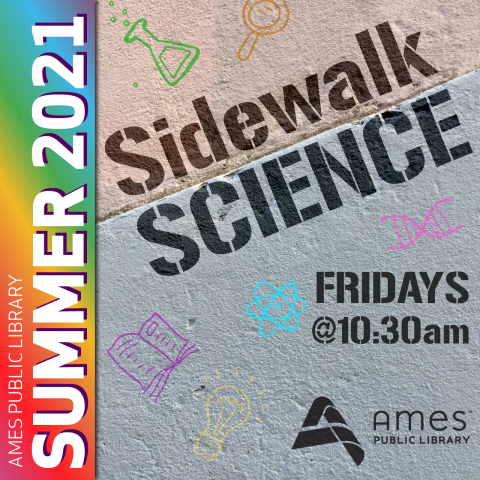
Sidewalk Science – Exploring Science with a Hands-on Approach
by Rosie Francis
Friday mornings are busy at the Ames Public Library. Patrons come in for browsing and borrowing material for the weekend, readers stop in to record their reading minutes and pick up prizes, and families gather in the library for Sidewalk Science – a STEM (science, technology, engineering, and math) program where we explore science and engineering concepts with a hands-on approach.
STEM influences every part of our life from the food we eat, to the technology we interact with, to the transport systems we use. Yet despite the ubiquitous presence, STEM subjects are often regarded as being hard, boring, and removed from everyday life. Dismantling this type of thinking--by exploring science using everyday objects and toys that young children play with--is an important goal for Sidewalk Science. The toys, including glow sticks, soap bubbles, and catapults, are used as learning objects to study scientific principles like chemical reactions, surface tension, and energy transfer.
The program makes science accessible to children by making play an important and integral part of the program. For instance, at our program with catapults, we played with three different types of catapults, talked about the potential to kinetic energy transfer that occurs in a catapult, and to further the engagement constructed catapults out of craft sticks and rubber bands to launch pom-pom projectiles. This hands-on approach to STEM exploration helps keep young learners engaged. It also aids their ability to absorb scientific concepts with an understanding of how something as abstract as energy transfer occurs in an everyday object.
The program environment is learner-centered and the learning that occurs is supplemented by the learning community. Participants are encouraged to talk with each other and work towards collaborative sense-making. This provides young children the freedom to think, tinker, and make.
Exploring STEM is serious fun! This exploration can be accomplished in many easy ways at home too. While the internet is replete with ideas for STEM experiments, there are also great resources at the library that I would like to share with you. One of my favorite books on everyday STEM is “STEAM Kids 50+ Science/Technology/Engineering/Art/Math Hands-on Project for Kids” by Anne Carey et al. This book has numerous experiments that can be done with household items. Each experiment also has the STEAM concept explained and provides extensions for further learning.
At this juncture let me take a moment to talk about the “A” in STEAM which stands for art. Art has a natural place in STEM. The ingenuity, curiosity, and problem-solving skills that STEM subjects encourage are very much part of art education and fosters creative problem-solving skills.
Another book that I have enjoyed doing experiments from is “Kitchen Cabinet Science Projects: Fifty Amazing Science Experiments to Make with Everyday Ingredients” by Dr. Michelle Dickinson. This book has some really cool experiments including how to make unicorn noodles and instant ice cream. There are several experiments in the book that cost less than a few dollars to do, and many use the ingredients that are staples in a kitchen pantry. One of my favorite experiments in this book is “Marbled Milk”. The experiment needs a plate or a bowl, milk, dishwashing soap, liquid food coloring, and a cotton swab, ingredients that can be found in most homes. We did this experiment together at the Sidewalk Science program on exploring colors and it was riveting. The science behind it is equally fascinating! Besides books, the library also has STEM kits that can be checked out.
STEM and STEAM subjects encourage innovation, creative problem solving, hands-on exploration, and working collaboratively. These skills are part of the 21-century skill set that children need to be successful in school and in life. Fostering these skills early can ensure a lifelong passion for learning, and a disposition that is ever curious.